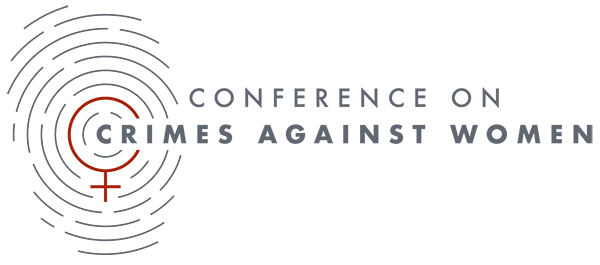Speaker Proposal
Deadline: September 30, 2025
21st Annual
Conference on Crimes Against Women
May 18 - 21, 2026
Sheraton Dallas Hotel
2025 Attendee Demographics
30
20
7
Remaining 43% comprised of medical, therapy, probation/parole, and protective services.
Conference Information
Session Setup
Our 2025 CCAW yielded approximately 2,400 attendees.
- There are roughly 200 time slots to fill. Session lengths vary.
- All Conference sessions are breakouts. Each room has 100-500 seats available.
- Speakers are required to provide their own laptop, clicker, and adapters for Mac laptops
COMPUTER LABS
90 minutes preferred; 3 hours case-by-case
- Attendees have the unique opportunity to practice cutting-edge, technology-based techniques in CCAW’s hands-on computer lab
- Attendees follow along with the presenter and practice, in real time, each method of investigation.
- CCAW provides the computers for this lab, and we will work with each presenter to ensure that the computers are pre-loaded with any needed software, etc.
INTERACTIVE SESSIONS
90 minutes preferred or 3 hours (Pt. 1 & 2)
Interactive sessions are designed to enhance the learning experience through activity-based exercises such as break out groups, role playing, attendee movement, etc. Q&A throughout the presentation is not considered interactive. CCAW interactive sessions include:
- Practical strategies and tips for implementing interactive session content into agency policies, protocols, and practices.
- The usage of real-life examples.
- Outcome-based objectives based on interactive exercise(s).
Noon Sessions
60 minutes
- Noon sessions are offered Monday-Wednesday
- Attendees will bring their lunch into the room for brief informational sessions and/or networking opportunities
- Ideal topics for noon sessions include:
- Quick refresher on best practices
- Updates to federal or statewide protocols
- Any other topic that would not fill a 90-minute workshop
Evening Screenings
Two hours (5:30-7:30pm, Tues & Wed)
- Two free screenings are shown for attendees each year
- Only one screening slot is available each evening (Tuesday and Wednesday only)
- Most screeners choose to show their film or snippets of their film with a short panel of experts afterwards.
- NOTE: CCAW is unable to provide screening fees or honorariums for evening screenings. We are happy to help put together a panel of experts from the speaker pool but are unable to facilitate the discussion; preferably the director or producer of the film will facilitate.
CASE STUDIES
90 minutes or 3 hours (Pt. 1 & 2)
- Case studies are the most popular sessions at CCAW every year; they provide an invaluable opportunity for attendees to learn from real-life situations.
- We ask that presenters walk attendees through the entire case, from investigation to prosecution to follow-up, highlighting the main “takeaways”—lessons learned, tips for interdisciplinary collaboration, innovative investigative/prosecutorial strategies, etc.
- Case studies must have at least two presenters from different fields (prosecutor, investigator, advocate, and/or survivor). These sessions are most effective when attendees are able to hear the case from multiple perspectives.
- NOTE: Case studies are selected based on learning points for attendees, not level of sensationalism.
PANEL DISCUSSIONS
90 minutes or 3 hours (Pt. 1 & 2)
The purpose of panel discussions is to address complicated issues that require a multidisciplinary and/or collaborative focus and approach. CCAW panel discussions entail:
- No more than four (4) panel speakers (preferably with partial or full funding).
- Diverse disciplines amongst panel speakers.
- Appointed moderator of panel discussion.
- Q&A opportunity either during or at the last part of the discussion.
WORKSHOPS
90 minutes or 3 hours (Pt. 1 & 2)
Workshops make up the large majority of the Conference agenda. While they vary largely in scope, all CCAW workshops include:
- Practical strategies and tips for implementing session content
- Real-life examples
- High level of audience interaction
- Time for Q&A at the end of the workshop
NOTE: Any proposal focused on practical techniques to combat gender-based crimes is encouraged. In addition, we are seeking the following topics for 2026:
- Civil/Family Law
- Clinical Considerations (therapy, counseling, social work, etc.)
- Community Engagement
- Corrections/Probation & Parole
- Crime Scene Investigations
- Dispatchers and Emergency Telecommunicators
- Emergency Medical Service (EMS) Considerations
- Expert-level Investigative and Prosecution techniques
- Forensic Genetic Genealogy Investigations
- Immigration Considerations for law enforcement and prosecutors
- Indigenous/Tribal Considerations for law enforcement and prosecutors
- Intersectionality and generational trauma considerations
- Judicial Considerations for DV, HT, stalking, and SA cases
- Latinx Considerations for law enforcement and prosecutors
- Law-Enforcement specific to patrol, LE training protocols, leadership
- Medical Examiner/Coroner Considerations
- Military and Civilian collaborations, investigations, and prosecutions
- Patrol 101
- Prosecution for DV, HT, stalking, and SA cases
- Stalking Investigations
Speaker Perks
CCAW provides:
- Full registration to CCAW (not including pre-conference)
- Breakfast (Monday-Thursday) and lunch (Monday-Wednesday)
CCAW may be able to provide:
- Transportation costs up to $400
- Lodging up to 2 days
- On-site parking
- Small honorarium (due to a limited budget, less than 10% of speakers will receive payment)
CCAW is unable to provide:
- Per diems
- Airfare baggage fees
- Airport parking fees
- Transportation costs to/from speakers’ home airports
NOTE: CCAW recognizes that some organizations are still adhering to COVID-19 restrictions involving travel and in-person conferences/meetings. However, at this time, CCAW will not be providing any hybrid options (i.e. in-person plus virtual). The 2026 Conference on Crimes Against Women will be entirely in-person. Changes to this decision will be distributed via e-blasts and CCAW website updates.
If you have any issues or questions regarding the proposal process, please contact Shawn Guy, Director of CCAW Programs & Operations, at sguy@conferencecaw.org


